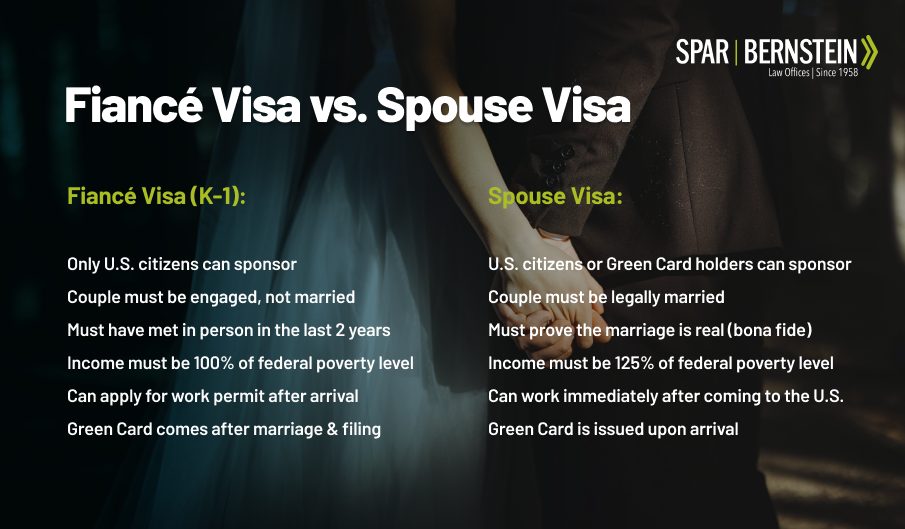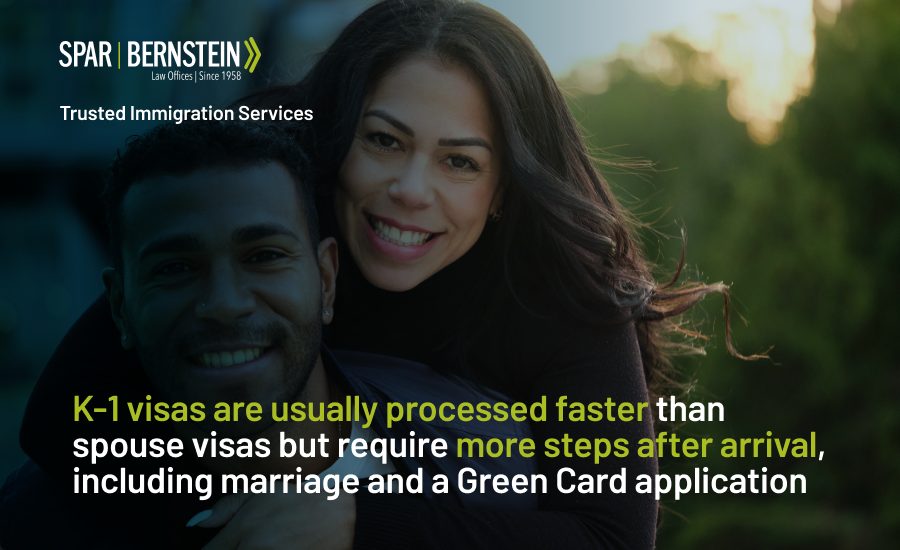

Fiancé Visa vs. Spouse Visa: Key Takeaways
- A K-1 visa allows a foreign fiancé to enter the United States and marry their U.S. citizen partner within 90 days
- A marriage visa allows a foreign spouse of a U.S. citizen or Green Card holder to come to the U.S. as a permanent resident
- The two visa types differ in eligibility, steps, and processing requirements
- Spouse visa holders receive a Green Card upon entry and can work immediately
- The K-1 process costs about $2,375, while the spouse visa is $1,355
- K-1 visas are usually processed faster, with the timelines varying depending on the case and service center
Trying to join your partner in the United States?
Whether you’re engaged to a U.S. citizen or already married to someone who lives in the U.S., you may feel overwhelmed by the tons of information you need to take in.
One of the biggest questions couples face is: Which one to pursue: fiancé visa or a spouse visa?
Read on to find out:
- Fiancé visa vs. spouse visa requirements
- What the application process looks like
- How much each option costs
- How long the process typically takes
Fiancé Visa Explained
As a nonimmigrant visa, the fiancé or K-1 visa enables the foreign fiancé of a U.S. citizen to enter the U.S. and marry their partner no later than 90 days after the fiancé’s arrival in the country.
Once the couple is married, the foreign spouse must go through an adjustment of status to obtain a Green Card.
The K-1 visa is non-renewable and expires once the 90-day period is over.
If the engagement ends before the couple is married, the U.S. sponsor can withdraw the fiancé visa petition, and the foreign fiancé must leave the U.S.
If the relationship ends after the couple is married, the foreign spouse may still qualify for an immigration option.
Holders of K-1 visas are allowed to work only after applying for a work permit using Form I-765, Application for Employment Authorization.
U.S. permanent residents are not eligible to file a petition for a K-1 visa.
Understanding The Spouse Visa
As an immigrant visa, the spouse or marriage-based visa allows the foreign spouse of a U.S. citizen or lawful permanent resident to enter the U.S. and establish permanent residency.
The foreign spouse can enter the U.S. through:
- A conditional resident visa (CR-1), if the couple has been married for less than two years at the time the visa application is granted/approved. After entering the U.S., the spouse receives a conditional Green Card if the marriage is under two years old.
- An immediate relative visa (IR-1), if the couple has been married for two or more years at the time the visa application is granted/approved. Upon arrival in the U.S., the spouse will get a Green Card with a validity of 10 years.
Spouse visa holders are allowed to start work immediately after their arrival to the U.S.
If the Green Card is conditional, the couple must apply for removal of conditions 90 days before the conditional Green Card expires. The process starts by filing Form I-751, Petition to Remove Conditions of Residence.
If the marriage ends in divorce and the foreign spouse has a permanent Green Card, their immigration status is typically not threatened.
However, if the foreign spouse has a conditional Green Card and wants to remain in the U.S., they must petition for a permanent Green Card individually.
Partnering with an experienced immigration lawyer is highly recommended to avoid the risk of deportation after the conditional card expires.
Key Requirements: Fiancé Visa vs. Spouse Visa
While both the K-1 visa and spouse visa share the goal of reuniting couples in the U.S., each type comes with unique requirements.
Fiancé Visa Requirements
To qualify for a K-1 visa, the U.S. sponsor must be a U.S. citizen and be able to financially support their partner by proving their income is over 100% of the most recent Federal Poverty Guidelines.
The foreign fiancé must live outside the U.S., have a clean criminal record, and meet the set health requirements.
- Both partners must be legally eligible to marry, with any prior marriages formally ended.
- The couple must provide proof of a legitimate relationship.
- The couple must have met at least once during the two years before the visa application is submitted.
Spouse Visa Requirements
The U.S. sponsor must be a U.S. citizen or a lawful permanent resident, with an income over 125% of the most recent Federal Poverty Guidelines.
The couple must have married outside of the U.S., and the foreign spouse must be eligible for a U.S. immigrant visa.

Comparing The Application Process For Fiancé Visa and Marriage-Based Visa
The application steps for each visa vary significantly in paperwork and timeline.
To apply for a K-1 visa:
- The U.S. citizen files Form I-129F, Petition for Alien Fiancé, with U.S. Citizenship and Immigration Services (USCIS).
- The applicant, also known as the beneficiary, waits until the Embassy or Consulate in their country notifies them that the National Visa Center (NVC) has conducted a preliminary visa processing of their application.
- The foreign fiancé files Form DS-160, Nonimmigrant Visa Application and pays the fees.
- The next step is an interview at the Embassy or Consulate.
If the application is approved, the beneficiary will receive their fiancé visa and be able to travel to the U.S.
Once the fiancé arrives in the U.S., the couple has 90 days to formalize their marriage. Then, the beneficiary must file Form I-485, Application to Register Permanent Residence or Adjust Status.
To apply for a spouse visa:
- The U.S. sponsor (citizen or lawful permanent resident) files Form I-130, Petition for Alien Relative, with USCIS.
- Once the foreign spouse is notified that the NVC has completed the preliminary processing, they file Form DS-260, along with Form I-864, Affidavit of Support Under Section 213A of the INA. I-864 is used to prove that the U.S. sponsor has sufficient financial means to support their spouse and prevent them from becoming a public charge.
The next stage involves a visa interview at the U.S. Embassy or Consulate in the applicant’s home country. Once approved, the next step is entering the U.S., where they receive their Green Card.
Fiancé Visa vs. Spouse Visa: Cost
If you’re applying for a K-1 visa, expect to pay around $2,375 in total fees, which covers:
- $675 for filing Form I-129F, Petition for Alien Fiancé
- $265 for filing Form DS-160, Nonimmigrant Visa Application
- $1,440 for filing Form I-485
Spouse visa applications are less expensive overall, totaling around $1,355:
- $675 for filing Form I-130, Petition for Alien Relative
- $120 for reviewing Affidavit of Support documents by the NVC
- $325 for filing Form DS-260, Immigrant Visa Application
- $235 for the USCIS immigrant fee, including the Green Card production
Fiancé Visa vs. Spouse Visa: Processing Time
The processing times for a K-1 visa petition by USCIS range between seven and 34 months.
The average time USCIS needs to process a spouse visa petition is:
68 months for the spouse of a U.S. citizen
- 97 months for the spouse of a U.S. permanent resident
- The time it takes to process a petition varies by field office or service center, while the estimated time is calculated based on the time it took to process 80% of the same type of petition over the past six months.
To check the estimated time of the field service or service center where your petition was filed, visit the Processing Time page on the USCIS website.

How Spar & Bernstein Can Help You With Your Fiancé Or Spouse Visa
As a trusted immigration law firm, our experienced attorneys at Spar & Bernstein represent clients in all aspects of immigration law, including family immigration, citizenship and naturalization, and nonimmigrant visas.
Our caring and compassionate team is well aware of the complexities involved with each visa type, and we work closely with every couple to support them throughout the process.
We will help you gather and file the documentation needed, assist with any additional requirements such as interviews and background checks, and address any concerns you might have.
If challenges arise, our knowledgeable lawyers will handle them in the best possible way, fighting for approval of your fiancé or spouse visa.
Contact our team to join the thousands of clients whose success stories we’ve proudly helped shape.
Pursue a family life together in the U.S. with your partner by working with the experienced team of Spar & Bernstein!
Marriage Visa vs. Fiancé Visa: FAQs
Can a Green Card holder sponsor a fiancé to come to the United States?
No. Only U.S. citizens can sponsor a foreign fiancé for a K-1 visa. If the partner is a Green Card holder, you must get married first and apply for a spouse visa.
Do I need to get married before applying for a spouse visa?
Yes. A spouse visa requires a legal marriage before the application process begins. It cannot be used for engaged couples.
Which visa is faster: fiancé or spouse?
Generally, the K-1 fiancé visa is processed faster, but the total time to obtain a Green Card may end up being longer due to the additional steps after arrival.
Can I work with a K-1 visa?
Not immediately. Before starting employment, you’ll need to apply for a work permit using Form I-765.
Can I work immediately with a spouse visa?
Yes. Spouse visa holders receive a Green Card upon entry and can start working right away.





